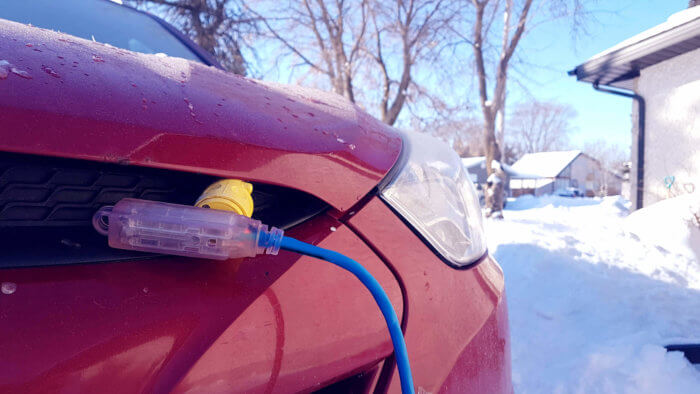Each year in the fall, Canadians are reminded of the long, cold winter ahead. Overnight temperatures drop and those parking outdoors find themselves scraping frost off the windshields of their vehicles in the early morning. Many drivers will begin using block heaters to keep their engines warm overnight and speed the time it takes for them to come up to temperature upon start-up. Using block heaters, however, can lead to vehicle and structure fires.

The most common types of block heaters installed in passenger vehicles involve a resistive heating element threaded or press-fit through a frost-plug in the engine block to warm the coolant. Some vehicles utilize oil pan heaters instead of, or in addition to, block heaters. This can be common on commercial vehicles such as heavy-duty trucks. These oil pan heaters can be magnetic or fastened with adhesive. Both block and oil-pan heaters are powered by connecting the wiring harness to an external 120-volt power source such as an exterior household or garage outlet.
There are several ways in which block and oil-pan heater systems can fail and ignite a vehicle fire. One common culprit is the cable that supplies power to the heater from a 120-volt receptacle. The cables can become mechanically damaged leading to a short circuit, or connectors can fail leading to a high-resistance connection. Either scenario is capable of igniting a fire. In 2018, Ford recalled over 400,000 F-150 pickup trucks due to issues with the block heater cords, citing risk of fire. The recall noted that water and contaminants could cause corrosion at the block heater cable connectors and lead to a fire. Many of those same vehicles were recalled again in 2019, due to problems with the repair procedure for the original recall. Ford is not the only manufacturer to issue a recall for this type of problem. It is a good idea to check with your vehicle’s manufacturer for any issues or search the Transport Canada database for recalls prior to using your heater for the first time each year.
Block heater systems can also fail due to faulty extension cords used to supply power to the heater. If the cords are undersized, they can become overloaded by the current flowing through them and ignite a fire. If the cords are pinched between the hood and frame, they can short circuit. If the cords are not plugged into the heater harness properly, a loose connection can heat up to the point of ignition for surrounding materials. If the vehicle is parked inside a garage, this can lead to a catastrophic structure fire. To reduce this risk, ensure you are routing your cord carefully, plug it in solidly, keep the connections clean and dry and use the proper sized extension cord for your application.
Another possible failure mode occurs if the heater elements themselves become unseated from their normal locations. This can occur if the heater cord is pulled causing the heater element to pull out of the frost plug on press-fit applications, or if adhesive fails on surface applied heaters. When this happens, the heater will overheat and essentially self destruct because there is no longer a sufficient pathway for conductive heat transfer away from the element. One way to guard against this is to have your heater regularly inspected by a licensed mechanic especially if the vehicle has been in a collision.
Regular maintenance and a bit of knowledge can help keep your block or oil-pan heater operating correctly and reduce the risk of fire. Keep these tips in mind to keep your vehicle, garage, and family safe this winter season.
